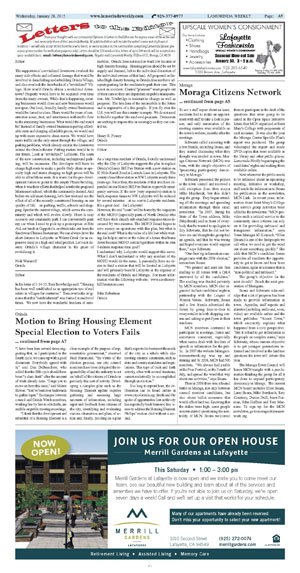|
|
Published January 28th, 2015
|
Motion to Bring Housing Element Special Election to Voters Fails
|
|
| By Laurie Snyder |
|
|
At the close of every Orinda City Council meeting, council members are asked if they want to initiate new matters. While sometimes policy-related, these actions often recognize worthy citizens or social causes. On Dec. 15, newly elected Orinda City Council Member Eve Phillips used her powers to have council consider whether or not to put Orinda's General Plan Housing Element up for public vote. On Jan. 20, with Council Member Amy Worth excused due to illness, council debated the idea at length, analyzing everything from fiscal prudence to the legal consequences of a failed vote.
 City Manager Janet Keeter presented information from Contra Costa Elections staff that the city would be charged a rate of $2.50 to $4.25 per voter for administering such an election - plus $91,000 to print the lengthy Housing Element for the voter information packet.
City Manager Janet Keeter presented information from Contra Costa Elections staff that the city would be charged a rate of $2.50 to $4.25 per voter for administering such an election - plus $91,000 to print the lengthy Housing Element for the voter information packet.
 City Planning Director Emmanuel Ursu explained the available ballot options. In response to continued assertions by members of the activist group Orinda Watch that the city has not received enough input on the Housing Element, Ursu also illustrated how and when the city has reached out to educate and receive feedback. (See the Lamorinda Weekly's 2013-14 archives for coverage.)
City Planning Director Emmanuel Ursu explained the available ballot options. In response to continued assertions by members of the activist group Orinda Watch that the city has not received enough input on the Housing Element, Ursu also illustrated how and when the city has reached out to educate and receive feedback. (See the Lamorinda Weekly's 2013-14 archives for coverage.)
 The vote could have occurred in one of three ways: a council-sponsored initiative; a voter-sponsored referendum requiring the measure to be placed on a ballot - if supporters could collect valid signatures from 10 percent of Orinda's roughly 12,000 registered voters; or a council-sponsored advisory vote.
The vote could have occurred in one of three ways: a council-sponsored initiative; a voter-sponsored referendum requiring the measure to be placed on a ballot - if supporters could collect valid signatures from 10 percent of Orinda's roughly 12,000 registered voters; or a council-sponsored advisory vote.
 Staff noted in its report that all three were problematic. The results of the advisory format would not have even been binding on the council, and it would have taken council members several meetings to draft ballot language. When combined with requirements that the election be held 88 days or later from the order of election, the city might not have been able to adopt its Housing Element by May 31, as required under California law. Furthermore, the costs seemed prohibitive in light of Orinda's road repair woes - woes that could worsen if the city were to lose the hundreds of thousands of dollars it receives annually in outside agency transportation funding because voters torpedoed the Housing Element.
Staff noted in its report that all three were problematic. The results of the advisory format would not have even been binding on the council, and it would have taken council members several meetings to draft ballot language. When combined with requirements that the election be held 88 days or later from the order of election, the city might not have been able to adopt its Housing Element by May 31, as required under California law. Furthermore, the costs seemed prohibitive in light of Orinda's road repair woes - woes that could worsen if the city were to lose the hundreds of thousands of dollars it receives annually in outside agency transportation funding because voters torpedoed the Housing Element.
 Orindans could also be risking fines and lawsuits. The City of Pleasanton has forked over about $5 million - the amount of Orinda's current reserve - for Housing Element problems. "And that does not even take into account the more immediate impact on our residents," said Council Member Victoria Smith. Many settlements prevented cities from doing business. "We could have people out on Ivy Drive or any other street in Orinda who couldn't even replace their water heater because they couldn't get a building permit because the city didn't comply with state law."
Orindans could also be risking fines and lawsuits. The City of Pleasanton has forked over about $5 million - the amount of Orinda's current reserve - for Housing Element problems. "And that does not even take into account the more immediate impact on our residents," said Council Member Victoria Smith. Many settlements prevented cities from doing business. "We could have people out on Ivy Drive or any other street in Orinda who couldn't even replace their water heater because they couldn't get a building permit because the city didn't comply with state law."
 Council members also heard again from residents pro and con. A handful of current and former Orinda Watch members echoed Phillips' assertions that the majority of Orinda residents distrust city leaders and disapprove of how they have conducted Orinda's Housing Element updates. Phillips suggested later on that ballot language should ask voters "whether you would prefer that document [the fifth cycle Housing Element draft] or one that would be written by a citizen committee."
Council members also heard again from residents pro and con. A handful of current and former Orinda Watch members echoed Phillips' assertions that the majority of Orinda residents distrust city leaders and disapprove of how they have conducted Orinda's Housing Element updates. Phillips suggested later on that ballot language should ask voters "whether you would prefer that document [the fifth cycle Housing Element draft] or one that would be written by a citizen committee."
 But others said those accusations were unfair and a special election is unwarranted. "I have been here several times suggesting that, as I participated in the fourth cycle, we came up with a good document. Everybody agreed with it," said Dan DeBusschere, who added that the fifth cycle should have been "a slam dunk" after the amount of work already done. "I urge you to move on from this issue," said Valerie Sloven. "You've bent over backwards to gather input." Exchanges between council and Orinda Watch members, working line by line to edit drafts, are audible on public meeting recordings.
But others said those accusations were unfair and a special election is unwarranted. "I have been here several times suggesting that, as I participated in the fourth cycle, we came up with a good document. Everybody agreed with it," said Dan DeBusschere, who added that the fifth cycle should have been "a slam dunk" after the amount of work already done. "I urge you to move on from this issue," said Valerie Sloven. "You've bent over backwards to gather input." Exchanges between council and Orinda Watch members, working line by line to edit drafts, are audible on public meeting recordings.
 "I think that the development and submittal of a Housing Element is a clear example of the purpose of representative government," observed Judd Hammond. "By virtue of the election process, our city council members have been delegated the responsibility of and the authority to act on behalf of the citizens of Orinda in precisely this sort of activity. Developing a complex plan such as the Housing Element update requires gathering and assessing large amounts of information, including input and feedback from citizens of the city, identifying and evaluating various alternatives and plans of action and, finally, deciding on a plan that's expected to best meet the needs of the city as a whole while also meeting external constraints, such as state and county mandates and regulations. This type of back and forth activity, often with several iterations, cannot realistically be accomplished through an election."
"I think that the development and submittal of a Housing Element is a clear example of the purpose of representative government," observed Judd Hammond. "By virtue of the election process, our city council members have been delegated the responsibility of and the authority to act on behalf of the citizens of Orinda in precisely this sort of activity. Developing a complex plan such as the Housing Element update requires gathering and assessing large amounts of information, including input and feedback from citizens of the city, identifying and evaluating various alternatives and plans of action and, finally, deciding on a plan that's expected to best meet the needs of the city as a whole while also meeting external constraints, such as state and county mandates and regulations. This type of back and forth activity, often with several iterations, cannot realistically be accomplished through an election."
 Too long to reprint here, the deliberation can be heard online at www.cityoforinda.org. Smith and Orr spoke of opportunities lost as the city has repeatedly back burnered key issues to address the Housing Element. Phillips' motion died without a second.
Too long to reprint here, the deliberation can be heard online at www.cityoforinda.org. Smith and Orr spoke of opportunities lost as the city has repeatedly back burnered key issues to address the Housing Element. Phillips' motion died without a second.

|
 Potential Costs of a Special Election Potential Costs of a Special Election
 � County Elections Department Cost Per Voter: $31,800 - $54,000 � County Elections Department Cost Per Voter: $31,800 - $54,000
 � Voter Information Printing - Housing Element: $91,000* � Voter Information Printing - Housing Element: $91,000*
 � Resulting Roads and Drains Funding Loss (potential): $330,000+* � Resulting Roads and Drains Funding Loss (potential): $330,000+*

 * Printing costs eliminated if materials posted online. If Housing Element voted down, possible loss or delay in infrastructure funding by outside agencies (Contra Costa Transportation Agency, et. al.). * Printing costs eliminated if materials posted online. If Housing Element voted down, possible loss or delay in infrastructure funding by outside agencies (Contra Costa Transportation Agency, et. al.).


 Other Orinda projects in the pipeline: Other Orinda projects in the pipeline:

 � Battery Backup-Traffic Signal Controls (2015-16): $20,000 � Battery Backup-Traffic Signal Controls (2015-16): $20,000
 � Oak Park-Donald Drive Pavement Rehabilitation: $180,000** � Oak Park-Donald Drive Pavement Rehabilitation: $180,000**
 � Pavement Management (small pothole patches): $75,000/yr (roughly) � Pavement Management (small pothole patches): $75,000/yr (roughly)
 � St. Stephens Trail and Drainage Improvements: $80,000*** � St. Stephens Trail and Drainage Improvements: $80,000***
 � Seismic Retrofit-Bear Creek Road Bridge: $720,000** � Seismic Retrofit-Bear Creek Road Bridge: $720,000**
 � Seismic Work-Miner Road Bridge (Right of Way expenses): $35,000 � Seismic Work-Miner Road Bridge (Right of Way expenses): $35,000
 � Urgent Repairs (big potholes, failed road segments): $100,000 per year (roughly) � Urgent Repairs (big potholes, failed road segments): $100,000 per year (roughly)

 **Estimated cost. Project currently unfunded and not scheduled. **Estimated cost. Project currently unfunded and not scheduled.
 ***Estimated cost. Project delayed until 2018 due to lack of funds. ***Estimated cost. Project delayed until 2018 due to lack of funds.
 Source: The Orinda Capital Improvement Plan 2014-2018 and other city sources. Source: The Orinda Capital Improvement Plan 2014-2018 and other city sources.
|
|
|
|
|
|
|
|
| |
|
|
|
|



